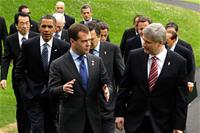Spending cuts vs. economic growth and development aid
Adelina Marini, June 27, 2010
 The diversity of the G20 economies is in the heart of the differences in their positions. For example the European Union managed to secure a common position for the Toronto summit, although the differences within the Union, and that can be felt stronger in the eurozone, suggest hard implementation of possible decisions. At their summit on June 17 in Brussels the European leaders agreed that a global approach was necessary when introducing levies on financial institutions. A major element of this would be the introduction of a global fee on transactions.
The diversity of the G20 economies is in the heart of the differences in their positions. For example the European Union managed to secure a common position for the Toronto summit, although the differences within the Union, and that can be felt stronger in the eurozone, suggest hard implementation of possible decisions. At their summit on June 17 in Brussels the European leaders agreed that a global approach was necessary when introducing levies on financial institutions. A major element of this would be the introduction of a global fee on transactions.
The EU will defend the position that a major risk for economic growth is late exit from public stimuli because this would additionally deteriorate public finances' sustainability. This is why it is necessary the G20 to agree on a coordinated but differentiated exit strategy in order to ensure soundness of public finances, the EU's position states.
And because the EU is represented in the G20 not only in its entity but also by some of its Member States, positions have also expressed Britain, France and Germany. In an article for a Canadian daily the new British Prime Minster David Cameron outlined the visions of his government about the Canada summit. He says that it was high time such summits to commit to actions and stop being just grant talking shops. In the typical exclusive style of Britain, Mr Cameron underlines that the countries should be flexible in order to react accordingly to their national circumstances. And with regard to bank levies, Britain had already taken steps in this direction and will introduce such a levy as of January 2011.
France and Germany are also undertaking similar measures, but according to Cameron it is not necessary everyone to do that.
Germany and France expressed a common position in a letter to the host of the summit - the Canadian Prime Minister Stephen Harper. Both countries focus on budgetary consolidation and call for an international agreement on bank levies. Furthermore, probably because of the debate that is taking place on a Community level about a budgetary peer review, the EU motors Berlin and Paris intend to propose to all G20 countries to agree to undergo peer reviews conducted by the FSB (Financial Stability Board).
And as if in order to confirm the convergence of the Russian position with the EU, president Dmitry Medvedev points out that it is necessary all countries to have a responsible budgetary policy and calls on his partners to announce their plans for budgetary deficit reduction.
The US president Barack Obama responded to that call and in his letter to Stephen Harper he writes that his government intends to reduce fiscal deficit by half by 2013 and to 3% of GDP by 2015. He says, however, that a careful approach is needed toward spending cuts because this might hamper economic growth. Mr Obama, like his British counterpart David Cameron, also says that consolidation should not be at any price - there needs to be flexibility, again conformed to national peculiarities.
Quite differently sound the positions of the developing countries. China hopes the G20 will completely apply the strategy for enhancing communication and coordination of macro economic policies in support of global economic recovery. Besides, the Group should require the IMF to complete its reform in a way to give better representation of emerging economies and the developing countries before its next summit in Seoul.
India is firmly against the introduction of bank levies because financial institutions are an integral part of economic growth.
In this context will the summit start and it will be interesting to see which priorities of the Western developed nations will be traded against more influence for the emerging economies.